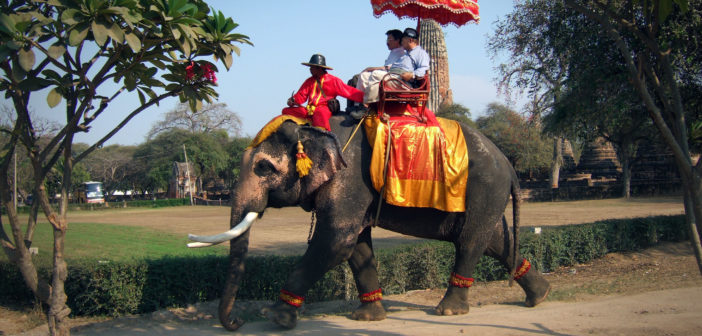The coronavirus pandemic has left many elephant owners in Asia without income from tourism. As a result, many owners in Thailand are opting to breed their elephants now whilst tourism is at a low, in an attempt to use the offspring to generate future income. Accounting for an elephant’s gestation period, this will inevitably lead to a ‘baby boom’ at a time when the animal welfare movement is trying to urge the United Nations World Tourism Organization (UNWTO) and Asian governments to take the sustainable approach and shut down the wildlife tourism industry across the region. Either outcome means catastrophe for many infant elephants.
Asia for Animals Coalition has supported a letter to the Thai government, requesting a temporary elephant breeding ban. Spearheaded by World Animal Protection, this letter is co-signed by 300 concerned NGOs.
To view the full letter, including signatories and citations, click here.
The body of the letter reads:
The undersigned organizations acknowledge and commend the Government of Thailand’s current efforts to contain the pandemic outbreak of the COVID-19 disease. This global crisis has especially affected the tourism sector. As a result, Thailand’s flagship animal, the elephant, is facing serious risks, such as starvation and lack of appropriate care. This situation is not only threatening the health of these animals, but also the livelihoods of many families, and highlights the unsustainable nature of the elephant tourism industry.
Elephant tourism venues emerged as an alternative use for logging elephants. In 2017, Thailand’s captive elephant population registered over 3,783 elephants, almost 30% more than at the time of the logging ban. The proportion of captive elephants who are used in tourism has grown significantly over time. Today the majority of captive elephants are being bred specifically for tourism, with their numbers consistently increasing. In 2010, of the entire captive elephant population in Thailand, 1,644 elephants were used in tourism camps. Five years later, this number increased to 2,198 elephants and in January 2020, 2,779 elephants were depending on tourism by giving rides, performing in shows or participating in bathing activities with tourists. There are now more than twice as many elephants in tourism camps in Thailand than in 2010.
With the significant reduction of tourists, most elephant camps have been forced to close their doors either temporarily or permanently, laying off thousands of staff and leaving venues and elephant owners struggling to care for their over 2,700 elephants. International NGOs and local organizations stepped in to help elephants to the best of their capacity. However, it is estimated that the food cost for the current population of tourism elephants in Thailand is more than USD 900,000 per month, with a similar amount needed for the salary of their caretakers.
Many elephant owners had to take their elephants back to their home villages in reaction to the current crisis. In the absence of any other use for their elephants, our concern is that elephant owners will attempt to breed them to generate income by further offspring for future use in tourism. This will have a devastating impact on Thailand’s captive elephants in the future, as even more elephants will compete for scarce resources. The situation will also negatively affect mahouts, a group of people that is often disadvantaged through low pay but high-risk employment. A recent unpublished study by Chiang Mai University has shown that over one-third of mahouts have no life savings and depend on a minimum wage job while bearing significant risks of serious and sometimes fatal injuries.
Even in the best of times, elephants are ill-suited for a life in the tourism industry. Their size, strength and intelligence require management practices, such as chaining, inhumane training and harsh punishment that cause severe pain and distress, and have been associated with the development of post-traumatic stress disorder (PTSD). In 2015 approximately 80% of tourism elephants in Thailand were considered to be kept under poor welfare conditions. The lack of space and resources to keep elephants adequately has been an increasing challenge, as the captive elephant population grew at an accelerated rate that we are now seeing is unsustainable.
The current situation highlights the high risk for captive elephants – and their caretakers – to depend on the tourism industry. This risk will only be aggravated if there is not a temporary breeding ban in place to prevent an exponential growth in the captive elephant population. Tourism flourishes in good times – but if there are struggles then things can take a very quick turn to the worse, with captive elephants being one of the first to suffer. Thailand, like many other prime tourist destinations, is unfortunately not immune to events that can seriously disrupt the tourism market, such as the financial crash in 1997, the tragic 2004 tsunami, or political crises that have shaken this remarkable country.
The tourism industry is not an appropriate place for captive elephants, and it serves no conservation value. Having this iconic, intelligent and endangered species depending on a commercial industry that is so vulnerable to economic fluctuations represents a great risk. As the situation with COVID-19 has reflected, the industry cannot sustain the current captive elephant population, let alone an increased number of animals that would result in unregulated captive breeding during this period.
The consistent increase in the number of captive elephants is now likely to be amplified through the relocation of many elephants to their home villages, and will have a devastating effect on the welfare of elephants and the people that depend on them, through further competition for already limited resources.
We call on the government of Thailand to act with urgency by issuing a temporary breeding ban for captive elephants in Thailand. This will allow limited resources to be dedicated to the urgently required care of the existing elephants and prevent further strains on resources during an uncertain tourism recovery period.
Featured image: an elephant ride in Thailand. Image credit tph567, CC BY-SA 2.0.





